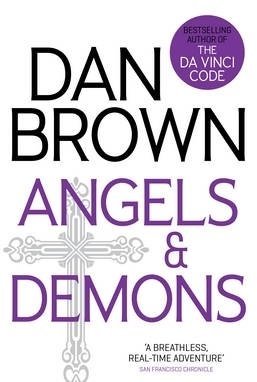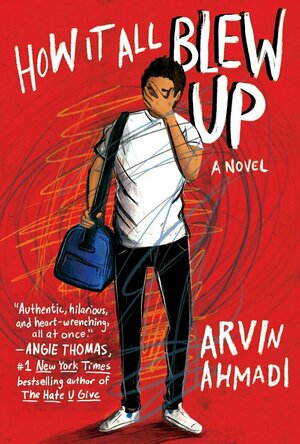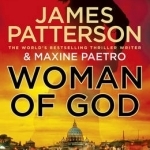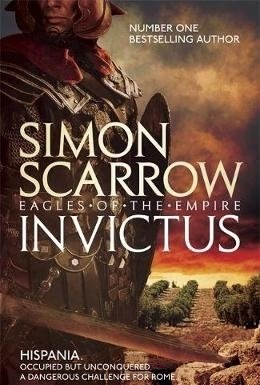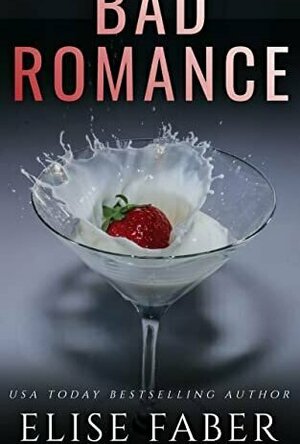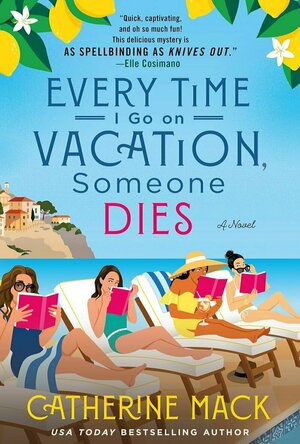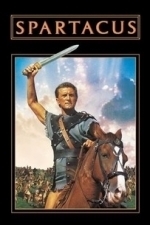Search
Search results
David McK (3562 KP) rated Angels and Demons in Books
Jul 4, 2021
First published back at the turn of the century (in the year 2000), this - while the second of the two Tom Hanks starring Robert Langdon movies, after The Da Vinci Code - is actually the first book in that particular series, albeit less well known than its sequel (the aforementioned The Da Vinci Code).
And, like, I'm sure, many others, I actually read that sequel first, only later discovering it was such (although, admittedly, not a direct sequel) and going back to read the first on the series.
This is the one largely set in and around Rome, with a high-tech ticking time-bomb counting down in Vatican City as the Cardinals all meet to elect a new Pope following the death of the previous incumbent of that role. It also makes lots of the (supposed?) divide between religion and science, drawing on lots of conspiracy theories and bringing back into the realms of popular culture that old secret society, the illuminati.
I have no problem with any of that, and I do like a bit of derring-do, mystery and romance, but even I found it hard at times to swallow some of the outlandish scenarios and set pieces of this novel - I think, for me, the icing on the cake was the surviving-a-jump-out-of-a-helicopter-without-a-parachute bit towards the end!
And, like, I'm sure, many others, I actually read that sequel first, only later discovering it was such (although, admittedly, not a direct sequel) and going back to read the first on the series.
This is the one largely set in and around Rome, with a high-tech ticking time-bomb counting down in Vatican City as the Cardinals all meet to elect a new Pope following the death of the previous incumbent of that role. It also makes lots of the (supposed?) divide between religion and science, drawing on lots of conspiracy theories and bringing back into the realms of popular culture that old secret society, the illuminati.
I have no problem with any of that, and I do like a bit of derring-do, mystery and romance, but even I found it hard at times to swallow some of the outlandish scenarios and set pieces of this novel - I think, for me, the icing on the cake was the surviving-a-jump-out-of-a-helicopter-without-a-parachute bit towards the end!
Heather Cranmer (2721 KP) created a post
May 8, 2021
Ali A (82 KP) rated How It All Blew Up in Books
Sep 8, 2020
How it All Blew Up is about Amir, a closeted, eighteen-year-old. He always knew it would be hard to come out to his Muslim family, so he hasn't. When some bullies find out and blackmail him, Amir gets scared, skips graduation, and fleas to Rome. He gets taken in by a group of new friends and he spends his summer having late nights where he can feel like himself. Until his old life comes back knocking. Now, Amir is telling the whole story, with the entire truth, to a U.S. Customs officer as his family has just been detained. Can Amir get his hard-won freedom back?
I went into this book thinking it would be a storyline I don't really see: representation of a queer Muslim in YA... I didn't really get that. Islam plays no part in this story - Amir openly admits his family isn't that religious. When asked if his parents would disapprove of him being gay, he replied:
"Yes and no. Our culture is pretty conservative, even if you're not religious."
It also went into this huge countdown leading up to what happened on the airplane and why the family is detained and when we get there... it just felt like it fell short of what it could have been. I also just didn't care much for the main character, he never really clicked with me and I honestly don't know why but I found myself rolling my eyes at a lot of his choices and reasonings.
The whole story also felt very unrealistic to me. How on Earth does an eighteen-year-old make enough money editing Wikipedia pages to get to Rome, get his own apartment, and live there a whole month? There were so many side characters that would be mentioned in passing for only a page and then never heard from again? Amir's high school boyfriend we get built up to be this whole thing, for him to just toss him aside. We had all these supposed close relationships (Amir and his sister were supposedly super close??) but everything felt surface level and not flushed out. There's an entire scene in the novel, that I won't get into because of spoilers, but it just felt wrong and had no real build up to the entire scenario besides small side remarks.
The only character I really even cared for was Amir's sister, Soraya. She was only thirteen, but she was a firecracker just waiting to be messed with. She cared for her brother, regardless of anything.
I did enjoy the back and forth of the interrogation rooms and what happened as it made it a super fast read. Apart from that though, I think the story fell short of what it could have been.
*Thank you Bookish First and Penguin Teen for a copy of this book in exchange for an honest review.
I went into this book thinking it would be a storyline I don't really see: representation of a queer Muslim in YA... I didn't really get that. Islam plays no part in this story - Amir openly admits his family isn't that religious. When asked if his parents would disapprove of him being gay, he replied:
"Yes and no. Our culture is pretty conservative, even if you're not religious."
It also went into this huge countdown leading up to what happened on the airplane and why the family is detained and when we get there... it just felt like it fell short of what it could have been. I also just didn't care much for the main character, he never really clicked with me and I honestly don't know why but I found myself rolling my eyes at a lot of his choices and reasonings.
The whole story also felt very unrealistic to me. How on Earth does an eighteen-year-old make enough money editing Wikipedia pages to get to Rome, get his own apartment, and live there a whole month? There were so many side characters that would be mentioned in passing for only a page and then never heard from again? Amir's high school boyfriend we get built up to be this whole thing, for him to just toss him aside. We had all these supposed close relationships (Amir and his sister were supposedly super close??) but everything felt surface level and not flushed out. There's an entire scene in the novel, that I won't get into because of spoilers, but it just felt wrong and had no real build up to the entire scenario besides small side remarks.
The only character I really even cared for was Amir's sister, Soraya. She was only thirteen, but she was a firecracker just waiting to be messed with. She cared for her brother, regardless of anything.
I did enjoy the back and forth of the interrogation rooms and what happened as it made it a super fast read. Apart from that though, I think the story fell short of what it could have been.
*Thank you Bookish First and Penguin Teen for a copy of this book in exchange for an honest review.
Whatchareadin (174 KP) rated Woman of God in Books
May 10, 2018
Brigid Fitzgerald is a doctor in South Sudan. She sees devastation every day, but her faith in God keeps her going. When tragedy falls on Brigid over and over again, her faith will be tested. Will she be able to find the purpose God has for her, or will she lose faith before that?
The story starts 20 years in the future on an Easter Sunday. I was reading the book around the same time, so it all seemed to fit in well together. Brigid is getting reading for Sunday morning mass at church. While in Rome, her good friend and reporter Zach is sitting outside of the Vatican waiting to hear who the new pope will be. Then the whole story rewinds and takes us back to where Brigid got her start as a young doctor working in the Sudan. Time after time, something tragic happens to Brigid and every time it does, she "hears" God. Throughout the course of the story she looses a boyfriend, 2 husbands and a child. To anyone that would tear them away from God, but it only draws Brigid closer. So close in fact that she becomes and ordained priest herself. Getting to meet the current pope and have his blessing upon her and her family.
With her unwavering faith, will it be enough to make her the first female pope?
This book was quite different from other things I have read by Patterson. It was an add to my quest to read James Patterson stand alones this year.
The story starts 20 years in the future on an Easter Sunday. I was reading the book around the same time, so it all seemed to fit in well together. Brigid is getting reading for Sunday morning mass at church. While in Rome, her good friend and reporter Zach is sitting outside of the Vatican waiting to hear who the new pope will be. Then the whole story rewinds and takes us back to where Brigid got her start as a young doctor working in the Sudan. Time after time, something tragic happens to Brigid and every time it does, she "hears" God. Throughout the course of the story she looses a boyfriend, 2 husbands and a child. To anyone that would tear them away from God, but it only draws Brigid closer. So close in fact that she becomes and ordained priest herself. Getting to meet the current pope and have his blessing upon her and her family.
With her unwavering faith, will it be enough to make her the first female pope?
This book was quite different from other things I have read by Patterson. It was an add to my quest to read James Patterson stand alones this year.
It's hard to believe this is now book number 15 in [a:Simon Scarrow|60636|Simon Scarrow|https://images.gr-assets.com/authors/1240832197p2/60636.jpg]'s now-so-called 'Eagles of the Empire' series: a series that, originally, was set during the Roman invasion of Brittania (in [b:Under the Eagle|578428|Under the Eagle (Eagle, #1)|Simon Scarrow|https://images.gr-assets.com/books/1315349321s/578428.jpg|565359]) and that had Carto as being junior to Macro - a situatuion that, by this point in their ongoing adventures, has reversed itself with Cato now the more senior of the two.
As this starts, Macro and Cato are on their way back to Rome (after the events of [b:Britannia|25028364|Britannia (Eagle, #14)|Simon Scarrow|https://images.gr-assets.com/books/1439580823s/25028364.jpg|44703249]: a novel in which, at the end, Cato received some unfortunate news. Distressibng news that, as the plot develops, becomes more and more only the tip of the iceberg (and that leads me to wonder if the author was letting his real-life experiences influence him when he was writing this? Or am I just reading too much into it? (as he has not been shy about sharing certain aspects on social media)), with this plot leading Cato and Macro to join a compny of the Praetorian Guard on an extended campaign, in which they have to defend a slave mine from a local uprising in Spain - an uprising that, to be fair, has a pretty valid reason behind it.
Once again, a thoroughly enjoyable read.
As this starts, Macro and Cato are on their way back to Rome (after the events of [b:Britannia|25028364|Britannia (Eagle, #14)|Simon Scarrow|https://images.gr-assets.com/books/1439580823s/25028364.jpg|44703249]: a novel in which, at the end, Cato received some unfortunate news. Distressibng news that, as the plot develops, becomes more and more only the tip of the iceberg (and that leads me to wonder if the author was letting his real-life experiences influence him when he was writing this? Or am I just reading too much into it? (as he has not been shy about sharing certain aspects on social media)), with this plot leading Cato and Macro to join a compny of the Praetorian Guard on an extended campaign, in which they have to defend a slave mine from a local uprising in Spain - an uprising that, to be fair, has a pretty valid reason behind it.
Once again, a thoroughly enjoyable read.
Deborah (162 KP) rated The Ides of April (Flavia Albia Mystery, #1) in Books
Dec 21, 2018
What's the next best thing to a new Falco novel? I suspect it must be this latest offering from Lindsey Davis who, with her tongue firmly in cheek, introduces us to the next generation in the form of Falco's adopted daughter, Flavia Albia, who is all grown up (and indeed widowed) and, guess what? Working as a private informer out of an apartment in Fountain Court!
If you liked the Falco novels, you'll like this, but if you haven't read any then you will be able to pick this up without any confusion about the back story. We've moved on from the somewhat benign Vespasian through the short lived Titus and on to mad, bad and dangerous to know Domitian. Falco and Helena are cautiously keeping their heads down!
Davis always has a knack from bringing ancient Rome to life so you get a bit of an history lesson without even realising it.
I was quite pleased with myself for picking out the culprit about halfway in. To start with, they seem to be random, senseless killings, but all is explained by the time you turn the final page - which seems to come all too soon. There were still some surprises in there that I didn't see coming too!
My favourite bit? A throwaway remark from Albia that her dad has seem some things so secret that he probably won't be able to publish his memoirs for a couple of thousand years.... Great stuff; bring on the next instalment!
If you liked the Falco novels, you'll like this, but if you haven't read any then you will be able to pick this up without any confusion about the back story. We've moved on from the somewhat benign Vespasian through the short lived Titus and on to mad, bad and dangerous to know Domitian. Falco and Helena are cautiously keeping their heads down!
Davis always has a knack from bringing ancient Rome to life so you get a bit of an history lesson without even realising it.
I was quite pleased with myself for picking out the culprit about halfway in. To start with, they seem to be random, senseless killings, but all is explained by the time you turn the final page - which seems to come all too soon. There were still some surprises in there that I didn't see coming too!
My favourite bit? A throwaway remark from Albia that her dad has seem some things so secret that he probably won't be able to publish his memoirs for a couple of thousand years.... Great stuff; bring on the next instalment!
Merissa (12934 KP) rated Bad Romance (Billionaire's Club #16) in Books
Mar 14, 2023
BAD ROMANCE is the sixteenth book in the Billionaire's Club series and after reading Tiff's story, I knew this one would be difficult. I was right, it is. If you have triggers, then please be careful. Saying that, it is also a story about surviving, about picking yourself up, putting all the pieces back together again, and living.
When Ash turned Mel down, it was for all the right reasons (or so he thought.) He quickly found out his mistake and had to live with the consequences. Mel called Ash in her hour of need, even though she regretted doing so. Once the lines of communication opened between the two of them, things started working out better. Ash knew just how much to push Mel, to bring her alive without being threatening. He also knew when to fall back, to give her time and space to regroup. Their relationship builds over time, step by careful step, until Mel is ready to move forwards.
Rome and Maddie are next, with a sneak preview in the epilogue - which was perfect for Ash and Mel, by the way. My heart is aching for him and I really can't wait to read how Maddie can help. The Hutchins family is definitely one I love and can't wait to read more of. HIGHLY recommended by me.
** same worded review will appear elsewhere **
* A copy of this book was provided to me with no requirements for a review. I voluntarily read this book, and the comments here are my honest opinion. *
Merissa
Archaeolibrarian - I Dig Good Books!
When Ash turned Mel down, it was for all the right reasons (or so he thought.) He quickly found out his mistake and had to live with the consequences. Mel called Ash in her hour of need, even though she regretted doing so. Once the lines of communication opened between the two of them, things started working out better. Ash knew just how much to push Mel, to bring her alive without being threatening. He also knew when to fall back, to give her time and space to regroup. Their relationship builds over time, step by careful step, until Mel is ready to move forwards.
Rome and Maddie are next, with a sneak preview in the epilogue - which was perfect for Ash and Mel, by the way. My heart is aching for him and I really can't wait to read how Maddie can help. The Hutchins family is definitely one I love and can't wait to read more of. HIGHLY recommended by me.
** same worded review will appear elsewhere **
* A copy of this book was provided to me with no requirements for a review. I voluntarily read this book, and the comments here are my honest opinion. *
Merissa
Archaeolibrarian - I Dig Good Books!
Mark @ Carstairs Considers (2355 KP) rated Every Time I Go on Vacation, Someone Dies in Books
Aug 15, 2024
Don’t Bother Booking This Vacation
Eleanor Dash’s first book was an instant best seller. It was inspired by a trip she took to Rome, and she fictionalized parts of it. She just didn’t change the hero’s name, and ever since, her ex, Connor Smith, has been worming his way into her life. Ten years later, Eleanor is planning to kill him off – at least in her next book. However, someone seems determined to do it in real life on a trip they are both on to celebrate ten years of her series. Can she figure out what is going on?
The premise of this one sounded fun, and I was intrigued when I heard that there are footnotes in the book. Sadly, the footnotes didn’t add anything; in fact, they came across as self-indulgent at times and lazy at others, like when the author put character descriptions in them. And I’ll call out the foul language, which was especially excessive at the beginning. (See your footnote complaining about calling out foul language didn’t work.) The characters were shallow, and some of their relationships and issues seems like issues that could have been resolved quickly. Eleanor herself doesn’t seem to fit her backstory. Yes, the characters grew, but it wasn’t quite enough for me. The pacing in the book was off as well, although there were some good twists. I did enjoy the virtual trip to Italy. In the end, this book wasn’t nearly as clever as it thought it was, so the result wasn’t as entertaining as I hoped it would be.
The premise of this one sounded fun, and I was intrigued when I heard that there are footnotes in the book. Sadly, the footnotes didn’t add anything; in fact, they came across as self-indulgent at times and lazy at others, like when the author put character descriptions in them. And I’ll call out the foul language, which was especially excessive at the beginning. (See your footnote complaining about calling out foul language didn’t work.) The characters were shallow, and some of their relationships and issues seems like issues that could have been resolved quickly. Eleanor herself doesn’t seem to fit her backstory. Yes, the characters grew, but it wasn’t quite enough for me. The pacing in the book was off as well, although there were some good twists. I did enjoy the virtual trip to Italy. In the end, this book wasn’t nearly as clever as it thought it was, so the result wasn’t as entertaining as I hoped it would be.
Ivana A. | Diary of Difference (1171 KP) rated 100 Speeches that roused the world in Books
Oct 5, 2020
<a href="https://amzn.to/2Wi7amb">Wishlist</a>; | <a
<a href="https://diaryofdifference.com/">Blog</a>; | <a href="https://www.facebook.com/diaryofdifference/">Facebook</a>; | <a href="https://twitter.com/DiaryDifference">Twitter</a>; | <a href="https://www.instagram.com/diaryofdifference/">Instagram</a>; | <a href="https://www.pinterest.co.uk/diaryofdifference/pins/">Pinterest</a>;
<img src="https://i1.wp.com/diaryofdifference.com/wp-content/uploads/2020/09/Book-Review-Banner-86.png?resize=768%2C432&ssl=1"/>;
<b><i>Boy, oh boy, do I have mixed feelings about 100 Speeches That Roused the World by Colin Salter.</i></b>
The reason I picked up this book is because I have always been in love with speeches and orators. I believe that the ability to speak in front of an audience is a very powerful skill, and I admire it as such. Many great leaders and many successful people use this skill to make people listen and act in a way they want them to. That is where the true art is, and I really admire this aspect. The fact that you can listen to two or more people tell you the same thing, and only one being able to convince you to do something or believe in something they say is a true gift.
Which takes us to the second reason I picked this book up. To find out more about the people who had this ability in history and made a difference in one way or another. And for the most part, I was pleased. There are speeches of many great (and not so great) leaders out there, speeches of people that made breakthroughs in their fields, people who fought for their rights.
<b><i>But there was a pattern I noticed in these 100 speeches.</i></b>
Most of these speeches were either from the UK or USA. And most of them were presidents, prime ministers,royalty or leaders in any other way. And all their speeches were speeches during the wars. Telling their people to fight for their nations.
And I have nothing against those speeches. They were perfect for their time and they did their purpose at the time. What I had a problem with is that there were so many more important times in history when a speech was made and it represented a change.
What about all the speeches that philosophers have given in ancient Rome and Greece? For Rome, where is Julius Caesar’s speech to the senate? For Greece, how about the movement for freedom of speech? What about the speeches during humanism and renaissance? What about some of the groundbreaking speeches that scientists have given over the years?
I was a bit disappointed with the format of the book as well, as the speeches were mostly short paragraphs, followed by a full page of the author’s notes, mostly quoting the same speech again. It was very helpful to know the background of how the speech made a difference in the world, but when most of those speeches didn’t really make any difference, and I was involved in a history lesson of the most important wars in history, it wasn’t much of a fun read.
<b><i>To conclude, this book wasn’t what I was looking for, both format and content wise. The 100 Speeches mentioned in this book didn’t do enough justice for me. I believe that title is misleading, but I can also understand that some people can still learn a lot by reading it.</i></b>
<a href="https://diaryofdifference.com/">Blog</a>; | <a href="https://www.facebook.com/diaryofdifference/">Facebook</a>; | <a href="https://twitter.com/DiaryDifference">Twitter</a>; | <a href="https://www.instagram.com/diaryofdifference/">Instagram</a>; | <a href="https://www.pinterest.co.uk/diaryofdifference/pins/">Pinterest</a>;
<img src="https://i1.wp.com/diaryofdifference.com/wp-content/uploads/2020/09/Book-Review-Banner-86.png?resize=768%2C432&ssl=1"/>;
<b><i>Boy, oh boy, do I have mixed feelings about 100 Speeches That Roused the World by Colin Salter.</i></b>
The reason I picked up this book is because I have always been in love with speeches and orators. I believe that the ability to speak in front of an audience is a very powerful skill, and I admire it as such. Many great leaders and many successful people use this skill to make people listen and act in a way they want them to. That is where the true art is, and I really admire this aspect. The fact that you can listen to two or more people tell you the same thing, and only one being able to convince you to do something or believe in something they say is a true gift.
Which takes us to the second reason I picked this book up. To find out more about the people who had this ability in history and made a difference in one way or another. And for the most part, I was pleased. There are speeches of many great (and not so great) leaders out there, speeches of people that made breakthroughs in their fields, people who fought for their rights.
<b><i>But there was a pattern I noticed in these 100 speeches.</i></b>
Most of these speeches were either from the UK or USA. And most of them were presidents, prime ministers,royalty or leaders in any other way. And all their speeches were speeches during the wars. Telling their people to fight for their nations.
And I have nothing against those speeches. They were perfect for their time and they did their purpose at the time. What I had a problem with is that there were so many more important times in history when a speech was made and it represented a change.
What about all the speeches that philosophers have given in ancient Rome and Greece? For Rome, where is Julius Caesar’s speech to the senate? For Greece, how about the movement for freedom of speech? What about the speeches during humanism and renaissance? What about some of the groundbreaking speeches that scientists have given over the years?
I was a bit disappointed with the format of the book as well, as the speeches were mostly short paragraphs, followed by a full page of the author’s notes, mostly quoting the same speech again. It was very helpful to know the background of how the speech made a difference in the world, but when most of those speeches didn’t really make any difference, and I was involved in a history lesson of the most important wars in history, it wasn’t much of a fun read.
<b><i>To conclude, this book wasn’t what I was looking for, both format and content wise. The 100 Speeches mentioned in this book didn’t do enough justice for me. I believe that title is misleading, but I can also understand that some people can still learn a lot by reading it.</i></b>
